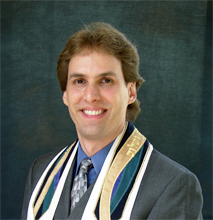“We are such stuff as dreams are made on,” Shakespeare once wrote. In this week’s Torah portion, we encounter one of the most famous dreams of Western literature: Jacob’s ladder. Parashat Vayeitzei describes the dream that Jacob has while departing the land of Israel for his mother’s homeland, Haran.
In the dream, you may remember, Jacob sees a ladder or stairway reaching from earth to heaven, with angels ascending and descending the ladder. The presence of God “stands” at the top of the ladder. God calls out to Jacob from there, inviting him to enter the covenant that God established with Jacob’s parents, Isaac and Rebekah, and his grandparents, Abraham and Sarah. God then tells Jacob that God will always be with him. Upon awakening from this remarkable vision, Jacob surveys his surroundings and exclaims: “Surely God was in this place, and I didn’t know it…How awesome is this place!” (Genesis 28:16-17)
Our tradition teaches us that angels (yes, Judaism has a strong tradition of angels) were “ascending and descending” the ladder because the angels that had accompanied Jacob on his journey inside the land of Israel had fulfilled their role and were now ascending to heaven, while a new set of angels were descending from heaven to accompany Jacob on his journey outside the land of Israel.
Be that as it may, what strikes me most about these angels “ascending and descending” heaven is that this upward and downward movement seems to reflect our lives, as well.
It certainly reflects Jacob’s. His life is a series of ups and downs, peaks and valleys. Like Jacob, sometimes we may wish life were different from this: “Just the peaks without the valleys, thank you very much.” Our aim may often be for the triumphs, for the successes, for the “peak” experiences. During the moments in-between – where much of life is lived – we may simply be biding our time until our next big achievement, our next vacation, or our next big event or celebration. Much of spiritual life, too, aims for the upward direction – the mountain top, the transcendent, heaven, blissful, extraordinary experiences.
Yet there’s another valuable direction in life, as well – into the valley, into the depths, perhaps even into the shadows of existence. Our upward movement is balanced by a downward movement (like the angels in Jacob’s dream). Heaven and earth. We need to embrace both.
It was the Jungian psychotherapist and former monastic Thomas Moore who profoundly brought this point home in the 1990s with his bestselling book Care of the Soul. Moore celebrates the downward, “descending” movement in human life. For Moore, “soul” is about depths, mysteries, shadows, complexities, weightiness; this in contrast to “spirit,” which is light, clear, airy, transcendent, aiming upward. Moore and his celebrated teacher James Hillman, z”l, frequently spoke about “growing down” – that is, adding substance, weight, and depth to our character and experience of life.
Think of moments in your life that were complex, weighty, or even difficult for you. Perhaps it was a family conflict, or a loss of some kind, or a career struggle. Having come through these valleys, have you not discovered within yourself more wisdom, more compassion, more meaning, more imagination, more richness, more soul?
The poet John Keats wrote, “Call the world if you please ‘the vale of soul-making.’” Indeed, valley and soul go together. Perhaps this is why the 23rd Psalm touches us so deeply: “Yea, though I walk through the valley of the shadow of death, I will fear no evil. For You [God] are with me…You have anointed my head with oil; my cup overflows.”
Our experience of the valley, no less than our experience of the heights, leads us to the realization of the fullness of life. By ascending and descending, our cup overflows.
May each of us embrace the valleys as well as the peaks of our lives. May we discover the richness and soul-growth that takes place during the difficult and dark times of our lives. May we perceive such inevitable times as opportunities to grow in wisdom and compassion, so that regardless of our circumstances we can truly say, “My cup overflows, for I realize that God is in this place.”
Explore Jewish Life and Get Inspired
Subscribe for Emails

